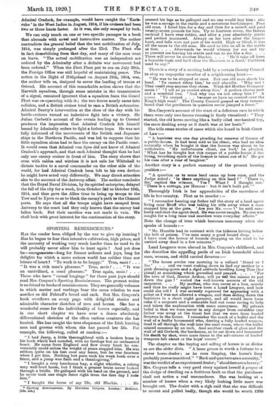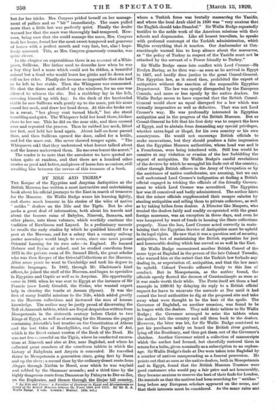SPORTING REMINISCENCES.*
HAS the reader been obliged by the war to give up hunting ? Has he begun to fear that intensive cultivation, high prices, and the necessity of working very much harder than he used to do will probably never allow him to hunt again ? And yet does he—unregenerate—long for former ardours and joys, long for delights for which a more serious world has neither time nor leisure of heart "To work is to be happy." True, twig I . . . " It was a rich man's pleasure." True, mail, I I. . . " It was an uncivilized, a cruel pleasure." True again, main I . . . Those who have " carnal longings " for these past joys should read Mrs. Conyers's Sporting Reminiscences. The present writer is no friend to books of reminiscences. They are generally volumes in which matter and verbiage bear the same relation to one another as did Falstaff's bread and sack. But Mrs. Conyers's book overflows on every page with delightful stories and admirable character sketches of men and horses. She has a wonderful sense for the individuality of horses especially, and in one short chapter we have over a dozen absolutely differentiated sketches of the often curious creatures she has hunted. She has caught the true eloquence of the Irish hunting men and grooms with whom she has passed her life. For example, the following, culled at random :-
" I had Jerry, a little thoroughbred with a broken bone in his hock which had mended, with no forelegs but an undaunted heart. He came from England and flew every bank he con- veniently could unless the weight of years stopped him. He was seldom quite on his feet over any fence, but he was fourteen when I got him. Nothing but pace took his weak hook over a fence, and a jump was flash and a thanksgiving." " I bought a very handsome bay, a slight whistler, a raking vary well-bred horse, but I think a greater brute never looked through a bridle. He galloped with his head on the ground, and he never took one single fence right from the first day I rode him."
" I bought the horse of my life, old Blackie. . . . He
• .Sporting Reminiscences. By Dorothea Conyers. London: Methuen. [me. net,] crossed his legs as he galloped and no one would buy him : also he was a savage in the stable and a notorious buckjumper. Poor old man. I hired him for a day and then for a month and paid twenty-seven pounds for him. Up to fourteen seven, the fastest oocktail I have ever ridden, and after a year absolutely gentle and perfect mannered. Always on his toes after the longest hunt, and falls were not part of his world. High or blind, it was all the same to the old man. He used to bite us all in the stable at first. . . . Afterwards he would whinny for me and try to prevent me leaving his stable and run to me like a dog. . . . There will never be another Blackie. . . . He'd take off from a bramble bush and he'd clear the Shannon in a flood,' Cuthbert used to say."
There is a story of a meeting held by a certain County Council to stop an unpopular member of a neighbouring hunt :- " He was to be stopped at once. But one old man shook his head. Ye cannot athop him,' he said placidly. Why not ? They could stop anyone they chose, What did Misther Dempsey mean ? ' ' I tell ye ye cannot athop him.' A perfect chorus now and a wrathful one. And why can we not athop him ? ' A pause. Ye cannot , . . because ye have no control over the King's high road.' The County Council gasped as they remem- bered that the gentleman in question never jumped a fence."
Mrs. Conyers's account of the start of a delicious race in which there were only two horses running is finely visualized : " They started, the old horse moving like a badly oiled mechanical toy, the mare dashing away as if death was at her heels."
She tells some stories of cases which she heard in Irish Court of Law:— "A barrister was one day pleading for renewal of licence of a public-house. It had been sold to his client, who had no idea naturally when he bought it that the licence was about to be withdrawn. My unfortunate client, me lord,' he pleaded. ' What has he bought but this corpse of a public-house if the living, breathing spirit of the licence is taken out of it.' He got his case after a roar of laughter."
Another story is a perfect summary of the present housing position :—
" A question as to some land came up here once, and the Judge asked s ' Is there anything on this land " There is, Sir,' replied the witness. Yee ? What ? I thought not.' There is a cottage, yer Honour but it isn't built yet.'"
Thoroughly Irish is her appreciation of the sacredness of life in her country. Twat as to murder :-
" I remember hearing my father tell the story of a land agent living near Brut/ who was taking his wife away when a man stopped him at the gate. ' Are you Mr. — he said care- lessly and shot the agent dead. He was never caught. No one was caught for a long time and murders were everyday affairs."
Note the change of tone which becomes necessary when she speaks of hounds :- " Mr. Humble had to contend with the hideous hitting below the belt of poison. I've seen many a good hound drop. . . . I have seen the horror of hounds dropping on the road to be carried away dead in a few minutes."
Land Leaguers were abroad in Mrs. Conyers's childhood, and she describes the appalling perils of an Irish household where man, woman, and child carried firearms :-
" The house awoke one morning to a valiant Stand or I fire ' . . . and we went rushing down to find my mother in a pink dressing-gown and a rigid attitude levelling Long Tom [her pistol] at something which grovelled and prayed. . . . For the love of God, Master Arthur, will ye bell the nasals to put down the gun ? ' wailed the well-known accents of the old =Tcarpenter. . . . My mother, who was never at a loss, merely hat he really might have been a Land Leaguer, and how could she tell ? I was severely reproved for appearing with a poker as I was not allowed a weapon, and then eliding down the banisters in a short night garment, and all would have been calm if a sergeant and a constable had not come racing to help and taken the explanation with some annoyance. My private belief is that we were never in any danger from outsiders (my father was away at the time) but that we were from loaded firearms in the house. I remember the crack of a bullet and the wail of a faulty housemaid who, dusting a fully loaded weapon, fired it off through the wall into the next room, where the bullet missed someone by an inch. And another crash of glass and the wail of old Corbett, the herdsman, as he sat down and bemoaned his death by shot, were mere items in the adventures of loaded weapons left about in the boys' rooms."
The chapter on the buying and selling of horses is as divine as are the Goiter dicta. " A lame groom is worth a fortune to a clever horse-dealer ; as he rims limping, the horse's limp probably passes unnoticed." "Back and quarters are a necessity," was the verdict of an experienced dealer; "shoulders are a luxury.' Mrs. Conyers tells a very good story against herself a propos of the dodge of dwelling on a fictitious fault so that the purchaser shall not notice a real unsoundness. She was looking at a number of horses when a very likely looking little mare was brought out. The dealer with a sigh said that she was difficult to mount and pulled badly, though she would be worth £200 but for her tricks. Mrs. Conyers prided herself on her manage- ment of pullers and so " bit " immediately. The mare pulled more than a little but was perfectly quiet. Finally the dealer warned her that the mare was thoroughly bad-tempered. How- ever, being sure that she could manage the mare, Mrs. Conyers took her home, found her the most sweet-tempered and generous of horses with a perfect mouth and very fast, but, alas ! hope- lessly unsound. This, as Mrs. Conyers generously remarks, was quite clever.
lu the chapter on superstitions there is an account of a Whis- perer, Sullivan. Her father used to describe how when he was a boy they had a mare which could not be ridden, a beautiful animal but a fiend who would burst her girths and lie down and roll on her rider. Finallysho became so impossible that she had to be left in her stable. Then the Whisperer was summoned. He shut the doors and stuffed up the windows, for no one was allowed to witness the rite. But a stableboy lay in the loft, covering himself up with hay. In the dusk of the barricaded stable he saw Sullivan walk gently up to the mare, put his arms round her neck, and draw her head down. At this she broke out in a sweat, " her glossy coat turned black," but she stood trembling and quiet. The Whisperer held her head there, his face close to her ear. This he did on the near side, and then crossed over and repeated the process. Then he rubbed her neck, lifted her feet, and held her head again. About half-an-hour passed thus, and then Sullivan opened the door, called for a bridle, and led the mare out. She never showed temper again. " The Whisperers said that they understood what horses talked about and the horses understood them. No one ever learnt the secret."
The reader is to note that the anecdotes we have quoted are taken quite at random, and that there are a hundred other stories as good and better, and pieces of horse-lore as curious, still awaiting him between the covers of this treasure of a book.











































 Previous page
Previous page